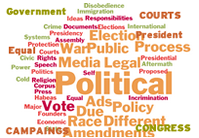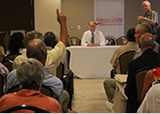|

Edward Snowden, the NSA, and Mass Survelliance
Edward Snowden worked as a computer systems contractor for the National Security Agency (NSA), which collects intelligence information for U.S. spy agencies. In 2013, Snowden gave journalists thousands of secret NSA documents. They revealed mass surveillance of terrorist suspects and of innocent Americans as well.
Hobbes, Locke, Montesquieu, and Rousseau on Government
This study of Enlightenment philosophers Hobbes, Locke, Montesquieu, and Rousseau is designed to give students an understanding of the ideas of these philosophers and is also an opportunity for them to reflect on humanity’s need for order and efforts to create stability within the social community.
The Marshall Plan for Rebuilding Western Europe
The Marshall Plan was a series of economic strategies and reforms that helped to strengthen Western Europe after World War II. It also helped to make the United States the leader of the free world.
Margaret Thatcher and Conservative Politics in England
In a historic election in 1979, voters in the United Kingdom (UK) elected Margaret Thatcher to be prime minister. She was the first woman ever to be elected to that office. She went on to be the longest-serving prime minister in the 20th century.
Are Bible Readings Ever Allowed in Public Schools?
The 1st Amendment to the U.S. Constitution begins with the establishment clause: “Congress shall make no law respecting the establishment of religion . . . .” Throughout the 20th century, The meaning of the establishment clause provoked debate, especially on the issue of prayer. The related issue of bible readings has also prompted great controversy.
|
|
The Free Exercise of Religion in America
This resource includes the main article and it accompanying activity, What Should the Test Be? A Close-Reading Activity on the Free Exercise Clause. An additional activity "Who Has the Stronger Case? Understanding Religious Freedom Laws in the United States" is also available availalbe in the downloadable pdf.
Affirmative Action in American Colleges After Fisher v. Texas
In 2013, the U.S. Supreme Court decided the affirmative action case of Fisher v. University of Texas. Some had expected the court to strike down affirmative action programs in higher education. Instead, the Fisher decision clarified previous rulings by the court.
The War in Afghanistan: What Should America’s Policy Be?
Under two different Commanders-in-Chief, the U.S. has been at war in Afghanistan for the past 13 years, making it the longest war in U.S. history. President Barack Obama announced that U.S. forces will withdraw from that country by the end of 2016.
Women in the Military
American women have gone to war in various roles throughout U.S. history. Only since 1948, however, have women been slowly integrated into the armed services. Today, a debate centers on whether women should be in direct ground combat.
Rachel Carson and the Modern Environmental Movement
In 1962, American biologist Rachel Carson wrote silent spring. Her explosive book revealed To the public the potential dangers of pesticides and also helped spark the modern environmental movement.
Conservation, Preservation, and the National Parks
The U.S. National Parks System began in the late 19th century. Over time, the rationale for national parks has expanded from simply maintaining scenery for tourists to restoring original ecosystems.
|







